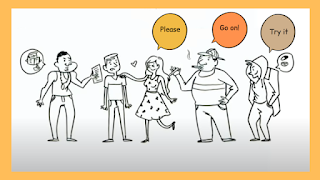Harvard psychologist Howard Gardner states in his book Changing Minds that by about age 10 a child’s peers rather than parents assume primary importance in the child’s decisions about what to do, especially in the United States. They are, he says, inclined to imitate those peers. This has become almost conventional wisdom in a lot of psychology schools.
Well of course peers do have a significant influence on kids, especially teenagers, but the question of who has more influence on them is quite a bit more complicated. The most obvious complication is that in the United States of recent years, there are a lot of different peer groups from which to pick. So what determines if a kid wants to be, say, a Goth or a jock? Even back when I went to high school back in the mid sixties in Southern California, there were surfers, greasers, jocks, “brains,” “soches,” guys in rock bands who wanted to grow long hair like the Beatles but were told by the boy’s vice principal to cut it, theater people, churchy people, and a lot of kids who didn’t fit any of classifications or straddled two or three of them.
With which peers adolescents choose to associate is not an accident of fate or necessarily the inclination of the developing child’s true-self tendencies. If their parents were pretty good about letting them learn to lead their own lives and develop their own opinions, then which peers they hung out with was most likely a result of their own developing self-actualization. But in more dysfunctional families, the kids’ behavior, as I have repeatedly discussed in this blog, is designed to stabilize unstable parents and maintain family homeostasis. If this is the case, the parents’ seeming needs steer kids in certain directions regarding their peers. For example, it may determine which kids turn into bullies and which turn into the bully’s victims.
This sort of question has been relevant
in psychiatry also. In the past, parents would allow their acting-out teens to
be placed in psychiatric hospitals, where shrewd but unethical hospital
administrators and psychiatrists blamed the adolescent’s emotional problems and
misbehavior – or even their suicide attempts - on cultural phenomena such as
heavy metal music. This way, the parents would not feel that they were being
scrutinized or blamed, and would gladly pay up.
Some hospitalized kids were kept there for months until their insurance
ran out and then summarily discharged. Peer
pressure was another scapegoat offered up by hospitals to these parents.
Gardner also mentions how American children even by pre-adolescence have “evolved strong preferences” that may not align with those of their kin and/or ethnic group, and can often state their opinions strongly and stand their ground in disputes. Again, I can’t argue that this doesn’t happen, but IMO this is way over-generalized. They may do that with certain opinions and planned activities, but not dare to question others. Opinions and plans are hardly an all-or-nothing phenomenon when it comes to potentially challenging family homeostasis. If an opinion is expressed and in response Mom sticks her head in the oven while other family members massively invalidate the person expressing the opinion, children standing their ground is almost never the result. And families are all completely different from one another when it comes to which shared internal conflicts are present over certain things, how severe those conflicts may be, or how many of them exist.








As a gen Xer, homeschooled, I can't remember a time I didn't overhear struggling adults blame ANYTHING other than themselves for their children's problems. Movies, music, books, peers, public school, Satan, innate teenage rebellion, magical mental insanity due to numeric age, clothing choices, toys, pop culture, parental sins, generational curses, Protestantism, the Jews, Liberalism, Democrats, and BAD SEED, but never the parents' trauma-fueled parenting. Anything but that! What trauma? They were beaten and liked it. The fact that their kids don't like it is due to (see above). No trauma to see here. Move along folks. Lock those kids up in isolation chambers with only their loving family, remove all peers, and watch them turn out fine and dandy! Yep. Totally works.
ReplyDelete